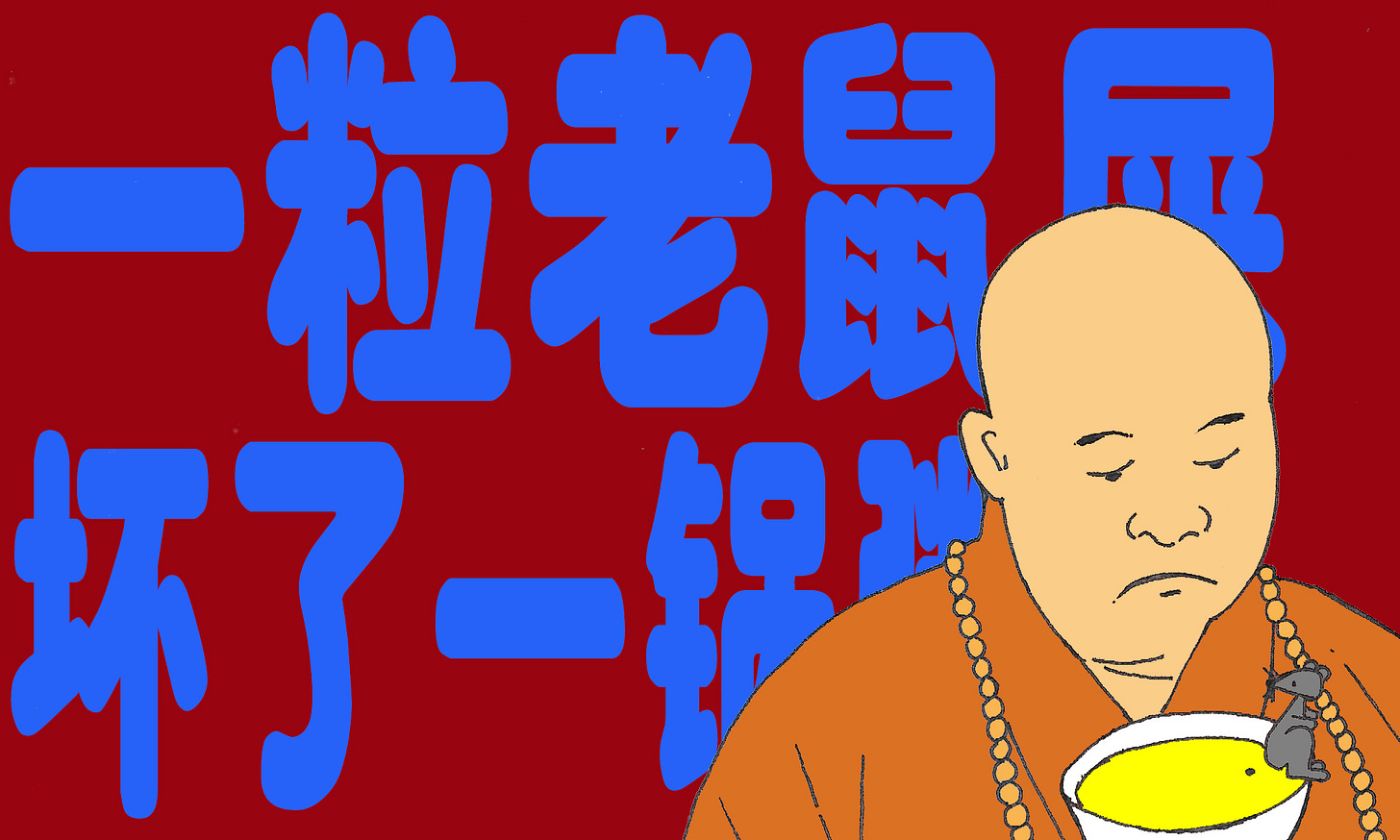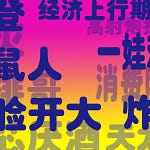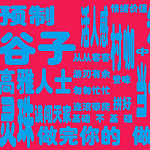Welcome to RealTime Mandarin, a free weekly newsletter that helps you improve your Mandarin in 10 minutes a week.
Subscribe today to get your fluency back, stay informed about China, and communicate with confidence in Chinese — all through immersion in real news.
The abbot of the world-renowned Shaolin Temple, Shi Yongxin (释永信), is under investigation for corruption.
He is accused of a long list of criminal offences:
"Misappropriating and embezzling project funds and temple assets; maintaining improper relationships with multiple women over an extended period, and fathering illegitimate children."
挪用侵占项目资金寺院资产;长期与多女女性保持不正当关系,并育有私生子。
That's a lot going on for one monk! And a long way from his humble start.
Born Liu Yingcheng (刘应成) in rural Anhui Province in 1965, he arrived at the run-down Shaolin Temple at age 16 to become a monk.
Back then, the temple was overgrown and all but abandoned, home to only a handful of elderly monks.
He became a disciple of the temple master and received his Dharma name, Yongxin (永信, which ironically translates as "eternally trustworthy"!).
Yongxin rose quickly through the ranks. At 19, he was appointed to the temple's management committee. At 22, he became its chairman, effectively taking control of temple operations.
On becoming abbot (方丈)—the spiritual leader of the temple—Shaolin underwent a dramatic transformation from crumbling relic to global martial arts brand.
Over the next two decades, Shi Yongxin oversaw rapid commercialisation of Shaolin, registering hundreds of trademarks and founding China's first business entity tied to a religious institution.
By 2008, Shaolin's commercial empire spanned tourism, health products, apparel, video games, and digital media.
Many dubbed it a "Buddhist business empire" and him the "Monk CEO" (佛门CEO):
"He doesn't seem like an abbot, but more like the boss of a content management company."
他不像是方丈,更像是一家MCN机构的老板。[1]
Related
Shaolin investments also expanded into real estate and finance. In 2016, the Shaolin business took a 5% stake in a rural commercial bank.
And Shi also partnered with the local government to build a Shaolin tourist town, with hotels, shops, and attractions generating hundreds of millions through rents and licensing fees.
In 2019, when tourist numbers peaked at 4.2 million, tourism income alone exceeded 1.2 billion yuan.
By 2022, he had acquired a 452-million-yuan plot in Zhengzhou for a joint venture Shaolin-themed real estate development.
Even traditional temple income was turbocharged at Shaolin.
Incense sticks (typically a few yuan) sell for at least 400 yuan in the temple, with expensive ones reaching 100,000 yuan. Want to experience being a monk? No problem! Money buys you any experience at Shi Yongxin’s Shaolin: a one-day meditation will set you back 200 yuan, a one-hour martial arts training is just 500 yuan, and a three-day study tour will cost you 3,800 yuan!
Shi also embraced new retail early.
According to leaked data, he generated 23 million yuan through ecommerce in 2020. When short videos took off, he became a Douyin livestream influencer, reportedly making over 5 million yuan in his first broadcast.
But according to Shi, he only ever drew a small salary, once famously saying:
My monthly salary is only 700 yuan. The temple earns several hundred million yearly, mostly for maintenance, salaries, and Buddhist activities. The rest goes to charity.
我每个月工资就700元,寺庙一年赚的好几亿,大多用在修寺庙、给和尚发工资、办佛教活动上,剩下的钱也都捐给慈善部门了。
His business success brought scrutiny, despite his claims of having no direct commercial interest.
In 2015, a former monk accused Shi of misconduct. The authorities dismissed the claims citing lack of evidence.
Ten years later, he faces very similar allegations.
But this time feels different. Shi hasn't been seen since July 20, his social media accounts silent since July 24. The temple has stayed quiet too, save for a brief statement distancing it from the allegations against Shi Yongxin.
This is a stark contrast to 2015 when he hit back against the allegations with a common Chinese phrase:
"If you don't do anything against your conscience, you won't fear ghosts knocking at your door.
I can withstand scrutiny, and Shaolin Temple has already reported this to the police."
不做亏心事,不怕鬼敲门,自己经得起考验,少林寺已经报警。
Well, it looks like the ghosts have finally come knocking!
As media discussions continue, no one is asking why this happened, but rather why it took so long for Shi Yongxin to fall. More importantly, who was his "protective umbrella" (保护伞) in the system, keeping him from getting caught until now?
The allegations have cast a long shadow over the Shaolin brand, as one observer notes with a common Buddhist teaching:
People like Shi Yongxin must be thoroughly investigated! We can't let a few mouse droppings spoil the whole pot of porridge.
像释永信这种人,必须往死里查,往重里罚!不能让他们披着袈裟继续祸害人,不能让这几粒老鼠屎坏了一锅粥。
So, that's what we're exploring this week!
Favourite Five
1. 贪欲 tān yù
greed, desire
所谓“慈悲为怀”,不过是掩盖贪欲的幌子 - So-called “compassion” is just a cover for greed. [1]
2. 扛把子 káng bà zi
mafia boss
简明扼要来说,他就是少林寺“扛把子” - Simply put, he’s the big boss of the Shaolin Temple. [1]
3. 七情六欲 qī qíng liù yù
human emotions and desires
钱多了,七情六欲也全回来了 - With more money, all the emotions and desires came back too. [1]
4. 恶贯满盈 è guàn mǎn yíng
full of evil, beyond redemption
无论是私德,还是公德,释永信都可以说是劣迹斑斑,恶贯满盈 - Whether in private or in public, Shi Yongxin can be said to have a disgraceful record and be rotten to the core. [4]
5. 一粒老鼠屎,坏了一锅粥 yí lì lǎo shǔ shǐ, huài le yì guō zhōu
one mouse dropping ruins a whole pot of porridge
不能让他们披着袈裟继续祸害人,不能让这几粒老鼠屎坏了一锅粥 - We can't let them keep wreaking harm under the guise of the monk’s robes, just like how we can't let a few mouse droppings spoil the whole pot of porridge.
More: learn more about this phrase in the Sinica Phrase of the Week on Sunday!
🎧RTM Podcast Preview
This week on the RTM Advanced podcast, you’ll learn how to use these three essential phrases when discussing corruption in flowing Mandarin:
“Backing/support” (靠山 kàoshān)
“Protective umbrella” (保护伞 bǎohùsǎn)
“When the tree falls, the monkeys scatter” (树倒猢狲散 shù dǎo húsūn sàn)
All three of these have figurative meanings in Chinese - they're talking about power structures, patronage, and what happens when protection disappears!
Tune in at 6 minutes where we break down what they mean, how native speakers use them, and how you can use them in real conversations.
💡 Ready to get inspired to bridge the gap to real-world fluency? 💡
As well as our Advanced podcast, every RTM post is packed with content and tools to inspire and help you get fluent.
This week we uncover loads of cool “must-know” on-trend phrases you need to discuss “rat people”.
So, ready to finally get started and wave good bye to that nagging rusty feeling?
Let’s jump in👇

















